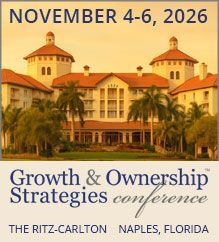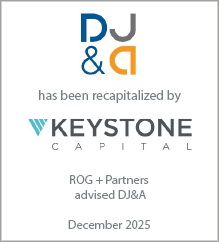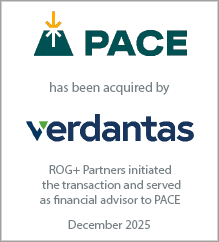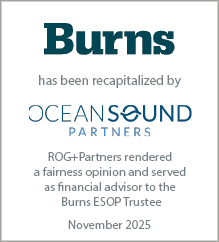Becca Gomez supports ROG+ Partners with business valuation analysis and M&A services. She examines financial statements, conducts economic research, develops valuation models, and prepares written reports. Before joining ROG+ Partners, Becca held previous positions at Stanley Ventures as a Venture Capital Analyst Intern and at PTC as a Corporate Development Intern. Becca graduated from Tufts University in May of 2023 with a B.S. in Quantitative Economics and a minor in Entrepreneurship.
Major Updates to the DBE Program:
What Firms Need to Know
October 8, 2025
In June, we examined how ongoing litigation and policy developments were creating uncertainty around the future of Disadvantaged Business Enterprise (DBE) and Minority/Women-Owned Business Enterprise (M/WBE) programs. Four months later, more uncertainty has been introduced through federal rulemaking.
On October 3, 2025, the U.S. Department of Transportation (DOT) published an Interim Final Rule in the Federal Register that revises the DBE certification process. The revised standards remove race- and gender-based presumptions of social and economic disadvantage and require all applicants—including roughly 41,000 currently certified firms—to submit individualized documentation demonstrating social and economic disadvantage.
The DOT made the policy change effective upon publication and established a 30-day public comment period that ends on November 3. Invoking the Administrative Procedure Act’s “good-cause” exception, the DOT cited constitutional concerns and ongoing litigation to justify immediate implementation without prior public comment.
Legal and Policy Context
The DOT's regulatory action follows developments in Mid-America Milling Company v. U.S. Department of Transportation, a case filed in 2023 in the U.S. District Court for the Eastern District of Kentucky. Mid-America Milling Company and Bagshaw Trucking, two contracting firms, challenged the DBE program's race- and gender-based presumptions, arguing they could not compete on equal footing with firms that qualified through those presumptions. The companies claimed the presumptions violated Fifth Amendment equal protection principles.
In September 2024, the court issued a preliminary injunction, finding the plaintiffs were likely to succeed on their constitutional claims. The court identified three problems with the DBE program: the DOT had not demonstrated past discrimination against the specific groups receiving presumptive eligibility; the program lacked a "logical end point"[1] four decades; and the presumptions were not narrowly tailored to address specific past discrimination.
In May 2025, following executive orders directing agencies to review programs based on race and gender, the DOT and the plaintiffs jointly requested court approval of a consent order. This order would require the DOT to acknowledge that the DBE program's presumptions are unconstitutional. Although the court has not yet ruled on the request, the DOT stated that it could not continue enforcing regulations it had determined to be unconstitutional and therefore implemented revised certification standards immediately.
What Changed: New Certification Requirements
Under the new certification standards, all applicants must now provide individualized proof of disadvantage, replacing four decades of group-based presumptions. Every applicant—whether newly applying or among the approximately 41,000 currently certified DBEs—must now provide a personal narrative and supporting documentation demonstrating both social and economic disadvantage.
Documentation Requirements
Each narrative must:
- Outline specific experiences where the owner faced barriers in education, employment, or business;
- Describe how those experiences caused measurable economic harm; and
- Include supporting financial records and a current Personal Net Worth (PNW) statement.
For example, a woman-owned environmental consulting firm that previously qualified for DBE certification by demonstrating it met the PNW threshold must now provide individualized, evidence-based proof of disadvantage—such as denied financing, lost contracts, or other barriers to business success—and show that those experiences resulted in measurable economic harm. Firms with multiple qualifying owners or certifications across multiple states face additional complexity, as documentation standards and review timelines are likely to vary by state or territory.
The new requirements do not change the existing PNW threshold for economic disadvantage, which remains $2.047 million, excluding the owner’s primary residence, ownership interest in the firm, and retirement accounts. However, the burden of demonstrating disadvantage has shifted from certifying agencies (which previously had to rebut presumptions) to individual applicants (who must now establish disadvantage affirmatively).
Recertification Process
Each Unified Certification Program (UCP), which is the certifying body operating within each state or U.S. territory, must reevaluate every certified firm under the new criteria “as quickly as practicable.”[2] During that process:
- Firms remain certified but cannot currently be counted toward DBE participation goals until reevaluation is complete;
- Recipients of DOT funds cannot set new DBE contract goals or count participation toward existing ones; and
- Firms that do not meet the new standards may reapply with additional evidence.
The DOT clarified that existing contracts will continue as awarded; however, goal-setting and counting of DBE participation are suspended until each UCP completes its reevaluation.
Administrative Changes
The new requirements also introduce terminology and reporting modifications:
- Replaces “race-neutral” and “race-conscious” with “DBE-neutral” and “DBE-conscious”;
- Eliminates requirements to collect race and sex data from bidders’ lists; and
- Requires that disparity studies—the analyses agencies use to set DBE participation goals—include a detailed capacity analysis explaining data sources, methodology, and market assumptions.
Implementation Considerations
Fifty-three UCPs across all states and U.S. territories must develop new evaluation procedures, train staff to assess narrative submissions, and process tens of thousands of reevaluations while managing regular certification workloads. Since the new requirements do not specify a timeline, implementation may vary across UCPs. Firms operating across multiple UCPs should prepare for differing documentation standards and review processes.
Agencies must also update forms, data systems, and disparity-study methodologies to comply with the new rule. Additionally, the new capacity analysis requirement may increase disparity study costs and extend the update cycles for some UCPs.
Preparing for the Transition
For certified firms, the next several months will focus on documentation, communication, and readiness:
- Begin early: Gather financial records, loan applications, and contract histories that support your narrative.
- Be specific: Identify particular experiences that created barriers and quantify the resulting impact where possible.
- Stay in contact: Watch for updates from your UCP regarding documentation requirements and timelines.
- Maintain stability: Continue focusing on client diversification and consistent project performance to limit exposure to any temporary disruptions.
Conclusion
The DOT's Interim Final Rule, effective October 3, represents a major shift in how firms qualify for DBE certification. Over the coming months, 53 UCPs across all states and U.S. territories will establish evaluation procedures for narrative-based applications, approximately 41,000 firms will be required to document individual experiences of disadvantage, and transportation agencies will navigate the transition with suspended goal-setting operations.
For firms, successful recertification will depend on early preparation, including gathering financial records, documenting specific barriers encountered, and maintaining open communication with certifying agencies. As the new standards are rolled out and firms are reviewed under the updated criteria, the program’s operation under the individualized framework will begin to take shape.
[1] Mid-America Milling Co. v. U.S. Dep’t of Transp., No. 5:23-cv-00156-GFVT, 2024 WL 4920113, at *8 (E.D. Ky. Sept. 20, 2024)
[2] Disadvantaged Business Enterprise (DBE) Program; Interim Final Rule, 90 Fed. Reg. 47969, 47973 (Oct. 3, 2025)
About the Author
rgomez@rog-partners.com
p: 617.274.8051
m: 562.391.8521








